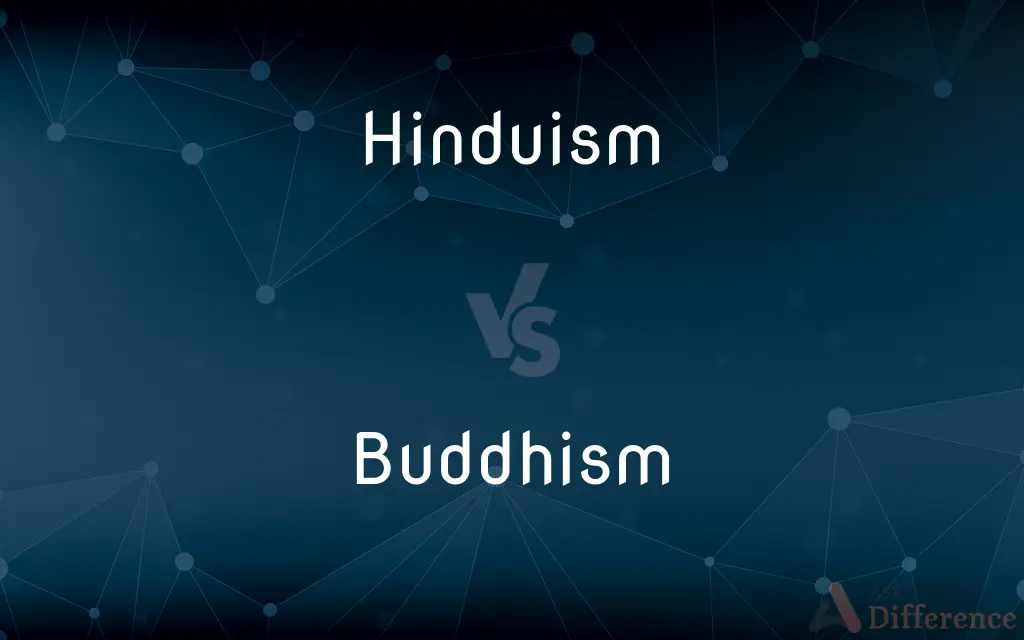Hinduism vs. Buddhism — What's the Difference?
By Tayyaba Rehman — Updated on September 19, 2023
Hinduism is an ancient Indian religion with diverse deities and scriptures, while Buddhism, founded by Siddhartha Gautama, emphasizes the Four Noble Truths and the Eightfold Path.

Difference Between Hinduism and Buddhism
Table of Contents
ADVERTISEMENT
Key Differences
Hinduism is considered one of the world's oldest religions, originating from the Vedic traditions of ancient India, encompassing a vast array of practices, beliefs, and scriptures. In contrast, Buddhism was founded around the 5th to 6th century BCE by Siddhartha Gautama, known as the Buddha, focusing on the cessation of suffering.
Central to Hinduism is the belief in an eternal soul (Atman) and the universal principle (Brahman). It also involves the intricate practices of rituals, devotion to various gods, and adherence to sacred texts like the Vedas. Buddhism, however, does not emphasize the worship of gods and generally rejects the idea of a permanent soul, focusing instead on the concept of 'Anatta' or 'no-self'.
The pursuit of dharma (righteous duty) and the cycle of birth, death, and rebirth (samsara) are key concepts in Hinduism. While Buddhism acknowledges samsara, it centers its teachings on the Four Noble Truths and the Eightfold Path as the means to achieve Nirvana, the end of suffering.
Hinduism integrates a caste system in its societal framework, which historically prescribed specific roles and duties for its adherents. Buddhism, in its teachings, largely disregarded the caste system, emphasizing individual pursuit of enlightenment.
While Hinduism has many sacred scriptures like the Vedas, Upanishads, and the Bhagavad Gita, Buddhism's primary texts are the Tripitaka or Pali Canon, detailing the Buddha's teachings and monastic rules.
ADVERTISEMENT
Comparison Chart
Origin
Evolved from Vedic traditions of ancient India.
Founded by Siddhartha Gautama in the 5th-6th century BCE.
Key Beliefs
Atman, Brahman, multiple deities, dharma, samsara.
Four Noble Truths, Eightfold Path, Anatta, Nirvana.
Sacred Texts
Vedas, Upanishads, Bhagavad Gita, Ramayana, etc.
Tripitaka (Pali Canon), Jataka Tales, etc.
Practice
Rituals, festivals, temple worship, yoga, meditation.
Meditation, monasticism, following the Eightfold Path.
View on Caste System
Integrates caste system.
Largely disregards the caste system.
Compare with Definitions
Hinduism
Ancient religion: Oldest major world religion originating in India.
Hinduism has a rich tapestry of myths and legends that span millennia.
Buddhism
Founder's teachings: Religion based on the teachings of Siddhartha Gautama.
Buddhism traces its roots back to the insights of a single individual.
Hinduism
Diverse beliefs: Encompasses a wide range of beliefs, gods, and practices.
Hinduism's flexibility allows for various interpretations and practices.
Buddhism
Non-theistic approach: Generally does not involve worship of gods.
Buddhism emphasizes personal experience over divine intervention.
Hinduism
Cycle of life: Emphasizes samsara, the cycle of birth, death, and rebirth.
In Hinduism, deeds determine one's position in the next life.
Buddhism
Path to enlightenment: Focuses on ending suffering through the Eightfold Path.
Buddhism offers a systematic approach to personal spiritual development.
Hinduism
Philosophical approach: Promotes the pursuit of dharma, artha, kama, and moksha.
Hinduism teaches that life has multiple purposes, including duty and bliss.
Buddhism
Monastic tradition: Strong emphasis on monastic life and meditation.
Many seek inner peace through Buddhism's meditative practices.
Hinduism
Sacred scriptures: Relies on texts like the Vedas and the Bhagavad Gita.
Many turn to the Bhagavad Gita for spiritual guidance in Hinduism.
Buddhism
Doctrine: Centers around the Four Noble Truths.
The Four Noble Truths in Buddhism provide a framework for understanding suffering.
Hinduism
Hinduism () is an Indian religion and dharma, or way of life. It is the world's third-largest religion, with over 1.2 billion followers, or 15–16% of the global population, known as Hindus.
Buddhism
Buddhism (, US: ) is an Indian religion based on a series of original teachings attributed to Gautama Buddha. It originated in ancient India as a Sramana tradition sometime between the 6th and 4th centuries BCE, spreading through much of Asia.
Hinduism
A major religious and cultural tradition of South Asia, which developed from Vedic religion.
Buddhism
A widespread Asian religion or philosophy, founded by Siddartha Gautama in north-eastern India in the 5th century BC.
Hinduism
A religious, philosophical, and cultural tradition that developed in India with the composition of the Vedas, characterized by belief in a supreme being of many forms and natures, by the view that opposing theories are aspects of one eternal truth, by the desire for liberation from earthly evils, and by belief in reincarnation.
Buddhism
The teaching of Siddhartha Gautama that life is permeated with suffering caused by desire, that suffering ceases when desire ceases, and that enlightenment obtained through right conduct, wisdom, and meditation releases one from desire, suffering, and rebirth.
Hinduism
The dominant religion of India; characterized by a caste system anud belief in reincarnation.
Buddhism
The religion represented by the many groups, especially numerous in Asia, that profess varying forms of this doctrine and that venerate Siddhartha Gautama.
Hinduism
A complex of beliefs and values and customs including worship of many gods, especially the Trimurti composed of Brahma the Creator; Vishnu the preserver; and Shiva the destroyer.
Buddhism
The religion based upon the doctrine originally taught by the Hindu sage Gautama Siddartha, surnamed Buddha, "the awakened or enlightened," in the sixth century b. c., and adopted as a religion by the greater part of the inhabitants of Central and Eastern Asia and the Indian Islands. Buddha's teaching is believed to have been atheistic; yet it was characterized by elevated humanity and morality. It presents release from existence (a beatific enfranchisement, Nirvâna) as the greatest good. Buddhists believe in transmigration of souls through all phases and forms of life. Their number was estimated in 1881 at 470,000,000.
Hinduism
The predominant religion of India; characterized by a caste system and belief in reincarnation
Buddhism
A religion represented by the many groups (especially in Asia) that profess various forms of the Buddhist doctrine and that venerate Buddha
Hinduism
A body of religious and philosophical beliefs and cultural practices native to India and characterized by a belief in reincarnation and a supreme beingof many forms and natures, by the view that opposing theories are aspects of one eternal truth, and by a desire for liberation from earthly evils
Buddhism
The teaching of Buddha that life is permeated with suffering caused by desire, that suffering ceases when desire ceases, and that enlightenment obtained through right conduct and wisdom and meditation releases one from desire and suffering and rebirth
Common Curiosities
What is the primary focus of Buddhist teachings?
Buddhism primarily focuses on the Four Noble Truths and the Eightfold Path to end suffering.
Is the caste system a part of Buddhist teachings?
No, Buddhism largely disregards the caste system.
Are gods central to Buddhism like they are in Hinduism?
While Hinduism involves worship of multiple deities, Buddhism generally does not emphasize god worship.
What is the origin of Hinduism?
Hinduism evolved from the Vedic traditions of ancient India.
Who founded Buddhism?
Buddhism was founded by Siddhartha Gautama, known as the Buddha.
How does Hinduism view the soul?
Hinduism believes in an eternal soul known as the Atman.
What are the core texts of Hinduism?
Some core texts of Hinduism include the Vedas, Upanishads, and Bhagavad Gita.
Can one be both a Hindu and a Buddhist?
While the religions have distinct beliefs, personal interpretation and practice vary, allowing some to identify with both.
Are rituals important in both religions?
Hinduism places significant emphasis on rituals, while Buddhism focuses more on meditation and personal practice.
How do the religions spread geographically?
Hinduism is primarily in India and Nepal. Buddhism spread to various parts of Asia, including China, Japan, and Southeast Asia.
What does Buddhism teach about the self?
Buddhism introduces the concept of 'Anatta', suggesting there's no permanent self.
Are there different sects within Buddhism?
Yes, major sects of Buddhism include Theravada, Mahayana, and Vajrayana.
Is reincarnation a shared belief in Hinduism and Buddhism?
Yes, both religions believe in the cycle of birth, death, and rebirth.
What role do monks play in Buddhism compared to Hinduism?
Monasticism is central in Buddhism. In Hinduism, monks (sannyasis) renounce worldly life, but it's one of many paths in the religion.
How do the religions view enlightenment?
In Hinduism, it's achieving union with Brahman. In Buddhism, it's achieving Nirvana.
Share Your Discovery

Previous Comparison
Codon vs. Anticodon
Next Comparison
Bronchitis vs. LaryngitisAuthor Spotlight
Written by
Tayyaba RehmanTayyaba Rehman is a distinguished writer, currently serving as a primary contributor to askdifference.com. As a researcher in semantics and etymology, Tayyaba's passion for the complexity of languages and their distinctions has found a perfect home on the platform. Tayyaba delves into the intricacies of language, distinguishing between commonly confused words and phrases, thereby providing clarity for readers worldwide.
















































